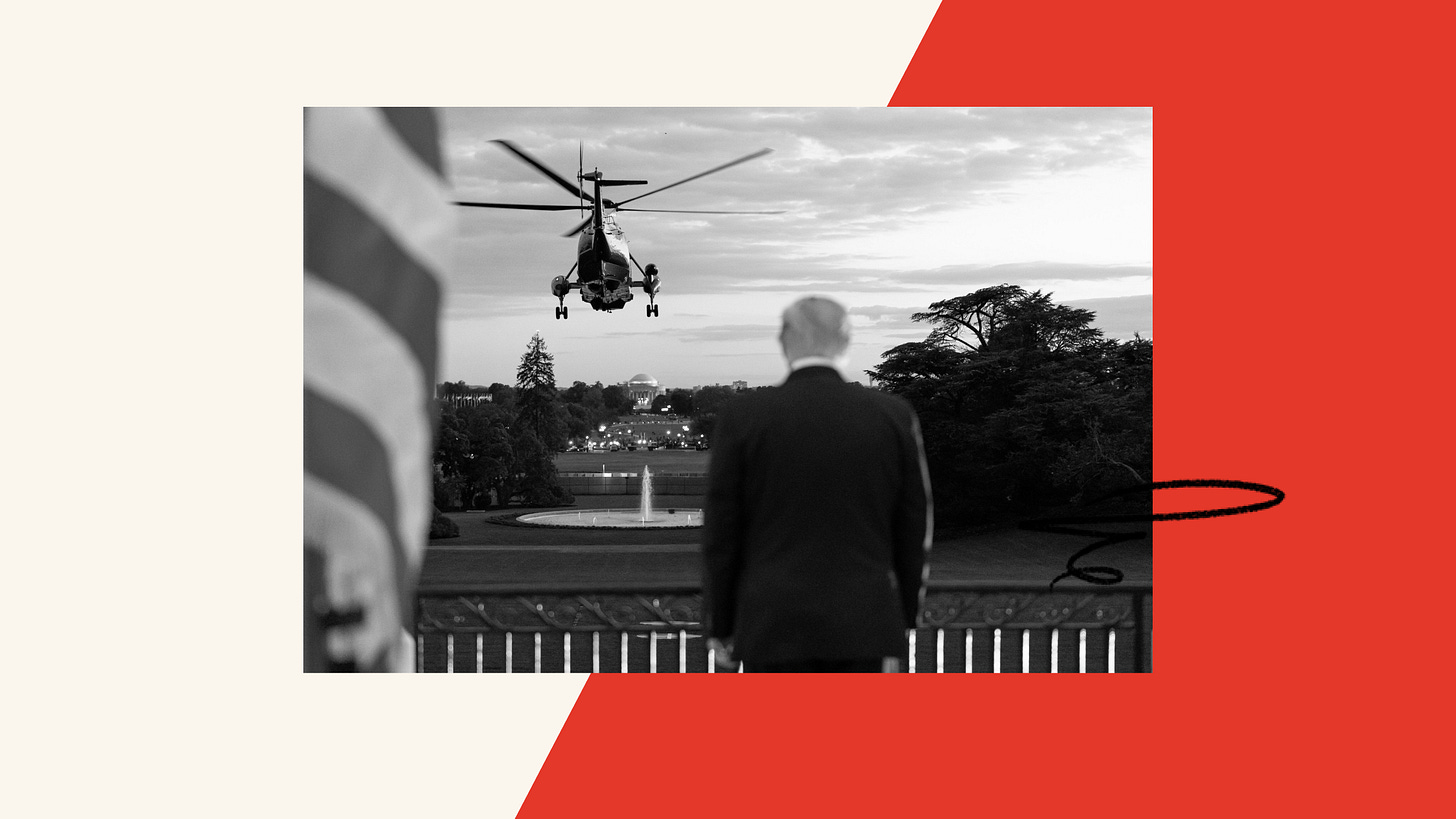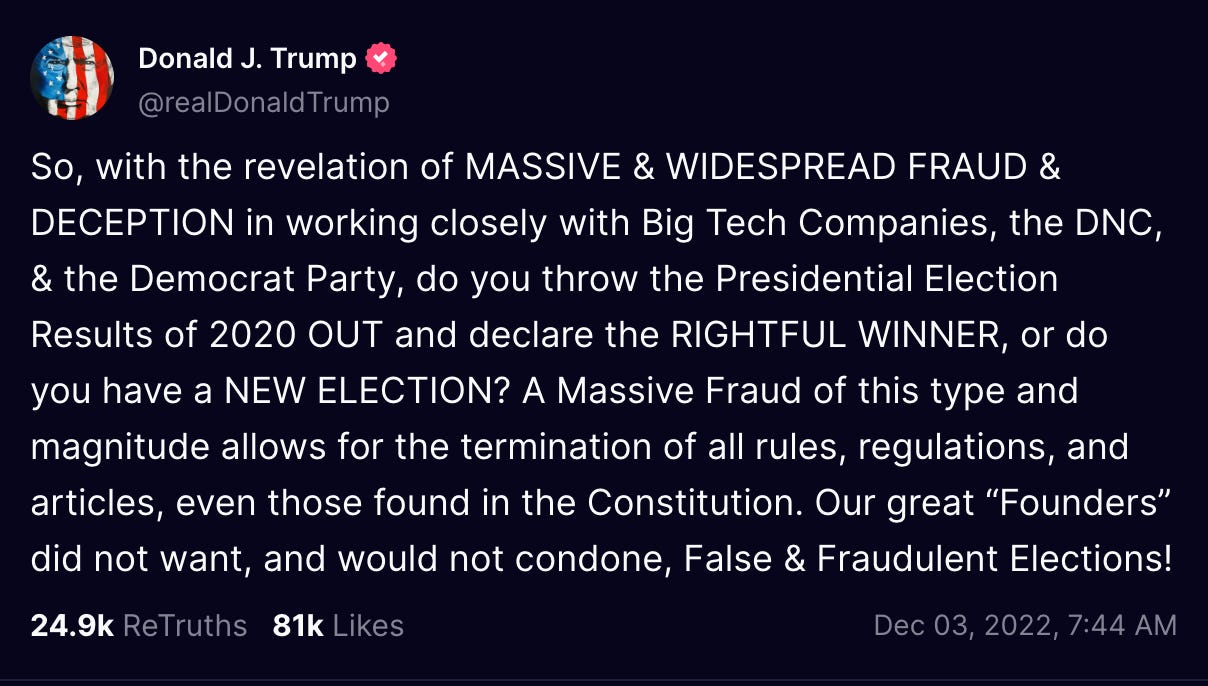Part Three: The autocrat who refuses to leave office
“We are going to win four more years. ... And then after that, we’ll go for another four"
In the first two parts of our three-part series documenting how authoritarianism could take hold in America, we discussed how Trump and his allies could pack the federal government with henchmen and how those loyalists could abuse their power to retaliate and intimidate people who challenge him.
To carry this forward in our final installment of this newsletter series, ask yourself this question: Once this authoritarian movement consolidates power, as promised, and wields it against its critics and enemies, would it easily give that power up? In the 2028 election? Or in the contests beyond that?
If they follow the model other autocrats have established, the answer is “no.” Especially considering the extreme measures Trump and his allies took to stay in power after losing in 2020, which started with conspiracy theories about a “stolen election,” calls to state officials to “find the votes,” dozens of unsuccessful legal challenges, a scheme to present fraudulent electors to Congress, requests for the Department of Justice to investigate the alleged “fraud,” a behind-the-scenes pressure campaign against then-Vice President Mike Pence, and finally, the violent insurrection at the U.S. Capitol on January 6th that resulted in the assault of more than 140 members of law enforcement.
The threat: The autocrat refuses to leave
Trump keeps hinting about staying in the White House beyond the two terms limited by the 22nd Amendment:
“We are going to win four more years. ... And then after that, we’ll go for another four years because they spied on my campaign. We should get a redo of four years.”
“You know, FDR 16 years — almost 16 years — he was four terms. I don’t know, are we going to be considered three-term? Or two-term?”
Trump at the National Rifle Association annual meeting in May 2024
While Trump often flirts with these ideas, he hasn’t floated any concrete plans about how he might stay in office beyond two terms. But that doesn’t mean his allies wouldn’t find the means to make this rhetoric a reality.
Fanciful legal arguments take hold
Trump has already shown an ability to get the courts to not only entertain but accept legal theories that were widely considered outlandish before his presidency.
When Trump asked the Supreme Court for “absolute immunity” from prosecution related to the January 6th insurrection, many legal experts expected the Supreme Court to reject the argument. Instead, a Supreme Court majority granted Trump immunity for “official” acts, creating a new protective bubble of criminal immunity for the presidency and immediately delaying his criminal proceedings against him past the 2024 election.
The takeaway is that uncompelling arguments and inventive legal maneuvering that may seem implausible can take hold. And quickly, too.
For this reason, his 2022 Truth Social post speculating the Constitution could be “terminated” to have a “new election” is one of those wild musings that shouldn’t be dismissed:
Trump has also floated the idea that the first two years of his first term were “stolen” by Special Counsel Robert Mueller’s probe into his 2016 campaign’s connections with Russia. That notion had support. At the time, a prominent ally stated, “Trump should have 2 yrs added to his 1st term as payback for time stolen by this corrupt failed coup.”
False emergencies and investigations
Conversely, he may simply attempt to circumvent the Constitution’s two-term presidential term limit by ginning up phony investigations or emergencies to indefinitely delay elections or the certification of the rightful winner.
To be clear, these tactics are illegal. And, while they may seem absurd from where we sit today, remember, he’s made promises and has plans to pack the government with henchmen and neutralize the remaining people and institutions that could oppose him. Unlike his first term, Trump and his allies are planning to surround him with staff willing to do whatever he requests.
There is another telling callback to his first term.
In the aftermath of the 2020 election, an executive order was drafted, although never issued, to direct the Secretary of Defense to seize voting machines. Politico reported that “the draft order would have given the defense secretary 60 days to write an assessment of the 2020 election. That suggests it could have been a gambit to keep Trump in power until at least mid-February of 2021.” We should not expect such actions would be blocked by federal appointees and officials next time.
GOP vice presidential nominee JD Vance has already signaled he would have gone along with schemes to obstruct or delay the certification of the winner of the presidential election to look at “problems.”
“If I had been vice president, I would have told the states, like Pennsylvania, Georgia and so many others, that we needed to have multiple slates of electors and I think the U.S. Congress should have fought over it from there. That is the legitimate way to deal with an election that a lot of folks, including me, think had a lot of problems in 2020. I think that's what we should have done."
We should also anticipate the legal terrain will be friendlier to Trump at the end of a second Trump Administration; Trump would have spent four years appointing judges and justices potentially willing to bless such brazen maneuvers.
Why it could succeed: our elections remain vulnerable to subversion and abuse
Regardless of how the autocratic movement would try to stay in power, a free and fair election in 2028 isn’t guaranteed. Some trouble spots ahead we’re thinking about:
By 2028, the Trump administration would have had four years to lay the groundwork to undermine future elections through federal legislation and administrative action.
State and local activists could pass legislation aimed at corrupting and subverting elections. (A robust effort to undermine non-partisan election administration has been underway since 2020.)
Blessed by the Supreme Court, efforts to gerrymander elections, mass-disqualify voters, undermine voting rights, and intimidate voters could escalate.
Continued disinformation efforts as Trump and his allies may keep spreading lie
What it would look like: a tilted playing field and increasingly meaningless “elections”
Is this truly plausible? Could 2024 be our last meaningful election? What would it really look like if our democracy were transformed into an autocracy – one where elections are held but are not free and fair? To figure that out, we must consider this whole arc of events and how these puzzle pieces fit together to lock in the entire picture.
Our three-part series does; this newsletter is the final part. If you are reading this for the first time, thank you, and welcome! Below are parts one and two to catch you up:
Part 2: The governing tools autocrats want to turn against us
If you find this useful, please share on your social media feeds! Your recommendations are the best way to spread this information. And if you know some skeptics who are open to a conversation, see if they would contemplate questions such as:
Is Trump more likely to succeed in staying in office if the Justice Department and large chunks of the judiciary are fully committed to his ambitions?
What about if much of the media and private sector are afraid to criticize the possibility of a third term for fear of retaliation?
What would it be like if millions of voters were scared to turn out for fear for their safety?
Because all of these actions flow in the same direction.
In the modern era, autocrats systematically slice away at democracy, step-by-step. We’ve seen this incremental erosion for the last eight years. Given the reality of the events that have occurred during this time, anyone who thinks that the democratic backsliding would only go so far in a second Trump Administration and then magically stop out of respect for something like term limits should reconsider.
The only way it happens here is if we believe that it can’t.
What else we’re tracking:
The great folks at the Committee for Safe and Secure Elections have published reference guides applicable to the laws in all 50 states and the District of Columbia to support law enforcement and election officials for the 2024 cycle.
CBS News reviewed Trump’s campaign pledges, compared them to Heritage’s Project 2025 proposals, and found hundreds of policy matches.
Margaret Hoover’s PBS Firing Line special “Counting the Vote” takes a deep dive into the nitty-gritty processes of how our elections are decided.
Who is going to teach AI about democracy? What happens if we don’t?
Military officials told The New York Times that an Arlington cemetery worker involved in an altercation with a Trump aide declined to press charges because “she feared Mr. Trump’s supporters pursuing retaliation.”





The 22nd amendment doesn’t have an enforcement mechanism. The Supreme Court ruled that individual states can’t enforce the 14th amendment disqualification of a presidential candidate. They also have immunized presidents against civil liability and criminal indictment for official acts. So how, when, and by whom is the 22nd amendment to be enforced?
Thanks Amanda - Yes it could happen here!